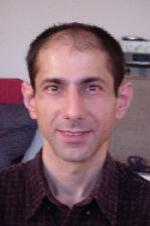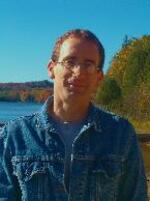About the Authors

Joshua Buresh-Oppenheim
Postdoctoral Fellow
Simon Fraser University
jburesho[ta]cs[td]sfu[td]ca
http://www.cse.ucsd.edu/users/jboppenheim
Postdoctoral Fellow
Simon Fraser University
jburesho[ta]cs[td]sfu[td]ca
http://www.cse.ucsd.edu/users/jboppenheim
Josh Buresh-Oppenheim received his
Ph. D. from the
University of Toronto
under the supervision of
Toni Pitassi
in 2005. Since then, he has been a postdoc at the
University of California, San Diego,
hosted by
Russell Impagliazzo, and at
Simon Fraser University, hosted by
David Mitchell.
His research interests include propositional proof complexity,
classifying algorithmic techniques, and computational complexity
in general. In his spare time, Josh is heir-apparent to the principality of
Liechtenstein.
When not on missions of diplomacy, he enjoys reënacting
episodes of
Welcome Back,
Kotter, critiquing trade shows for the
New Orleans Times Picayune,
and fabricating biographies.
Nicola Galesi
Associate Professor
Università degli Studi di Roma La Sapienza
galesi[ta]di[td]uniroma1[td]it
http://www.dsi.uniroma1.it/~galesi/
Associate Professor
Università degli Studi di Roma La Sapienza
galesi[ta]di[td]uniroma1[td]it
http://www.dsi.uniroma1.it/~galesi/
Nicola Galesi received his
Ph. D.
in Computer Science from the
Universitat Politecnica de Catalunya
of Barcelona (Spain) in 2000 under the direction of
Maria Luisa Bonet.
At present, he is an associate professor in the
Department of Computer
Science at Università degli Studi di Roma
"La Sapienza" (Italy).
Formerly (01/05) he held a similar position in the Department of
Computer Science of the Universitat Politecnica de Catalunya.
He was a postdoc at the
Institute for Advanced Study
as a member of the School of Mathematics during the Special Year in
Computational Complexity (00/01) and in 2002 he was a postdoc in the
Department of Computer Science
of the University of Toronto
(Toronto, Canada) in the Theory Group.
His main research interest is in complexity theory, especially
in lower bounds in proof complexity.
In addition to spending time with his family,
Nicola practices Taoist Tai Chi, is an avid reader and moviegoer,
likes to play the guitar, and enjoys Japanese cuisine.

Shlomo Hoory
Postdoctoral Fellow
University of British Columbia
shlomoh[ta]cs[td]ubc[td]ca
http://www.cs.ubc.ca/~shlomoh
Postdoctoral Fellow
University of British Columbia
shlomoh[ta]cs[td]ubc[td]ca
http://www.cs.ubc.ca/~shlomoh
Shlomo Hoory received his
Ph. D.
in Computer Science from the
Hebrew University Jerusalem
in 2002 under the supervision of
Nati Linial.
Since then he has been a postodoctoral fellow at the
theory group at the
University of Toronto
and the
University of British Columbia.
In April 2006 he will join
IBM Haifa Research Lab.
His research interests include algebraic graph theory, expanders,
graphs of high girth, cryptography, and error correcting codes.
He is especially interested in extremal properties of irregular graphs.
Apart from academic life, he has practical experience from
his long episodes in the high-tech industry. This experience includes
programming, real time systems, OS internals, VLSI design,
and digital signal processing.

Avner Magen
Assistant Professor
University of Toronto
avner[ta]cs[td]toronto[td]edu
http://www.cs.toronto.edu/~avner
Assistant Professor
University of Toronto
avner[ta]cs[td]toronto[td]edu
http://www.cs.toronto.edu/~avner
Avner Magen did his
B.Sc., M.Sc., and Ph.D. at the Hebrew University Jerusalem
under the supervision of
Nati Linial.
He is now an assistant professor at the
Department of Computer Science,
University of Toronto. His main
interest areas are metric embeddings,
lower bounds to combinatorial optimization problems and approximation
algorithms. He enjoys travelling and hiking.

Toniann Pitassi
Professor
University of Toronto
toni[ta]cs[td]toronto[td]edu
http://www.cs.toronto.edu/~toni
Professor
University of Toronto
toni[ta]cs[td]toronto[td]edu
http://www.cs.toronto.edu/~toni
Toni Pitassi received bachelors and masters degrees from
Pennsylvania State University
and then received a
Ph. D. from the
University of Toronto
in 1992 under the supervision of
Stephen Cook.
After that, she spent 2 years as a postdoc at
UCSD, and then 2 years as an
assistant professor (in mathematics with a joint
appointment in computer science) at the
University of Pittsburgh.
For the next four years, she was a
faculty member of the Computer Science Department at the
University of Arizona.
In the fall of 2001, she moved back to Toronto,
where she is currently a professor in the Computer Science Department.
Her research interests include proof complexity, circuit complexity,
classifying algorithmic techniques, analysis of SAT-solvers, and the
theory of machine learning.
